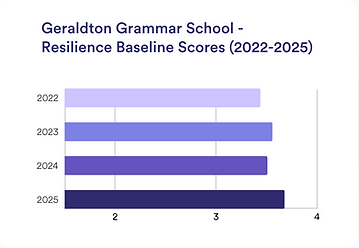Geraldton Grammar School
Listening to Students. Strengthening Wellbeing
The School and Context
-
Geraldton Grammar School is an independent co-educational school in regional Western Australia
The school has a strong reputation for personalised learning and student care and wanted to strengthen its universal and targeted wellbeing supports. Their INSPIRE – Learning for Life approach to social emotional education is embedded across all year levels, with a focus on belonging, positive relationships, and equipping students with self-awareness and self-regulation skills.
The Opportunity
The Wellbeing Leaders at Geraldton Grammar recognised that wellbeing was central to student learning, but they lacked a consistent, rigorous way to:
-
Track how students were feeling, responding and coping across the school year.
-
Identify trends in student wellbeing at both the class and whole-school level.
-
Identify students at risk who need more urgent support or intervention.
-
Provide teachers with timely, actionable insights to support early intervention.
Acknowledging the evidence that early intervention is key to preventing long-term mental health challenges (Polanczyk et al., 2015; Murdoch Children’s Research Institute, 2023), the school sought a robust, evidence-informed instrument, with supporting resources, that could provide baseline and check-in data to guide universal practices and ensure targeted supports were delivered when needed.
The Collaborative Approach:
Geraldton Grammar partnered with Pivot to implement Wellbeing Learning Insights from Years 3 through 6. Pivot’s platform enabled the school to:
-
Run baseline surveys to understand students’ sense of safety, belonging, and wellbeing at the start of the program.
-
Conduct weekly check-ins with students to monitor changes and identify those who may require extra support.
-
Provide teachers and leaders with accessible reports to guide classroom strategies and Tier 2 and 3 interventions.
-
Align wellbeing insights with Geraldton’s existing Multi-Tiered Systems of Support (MTSS) approach to social-emotional education, ensuring data directly informed practice and tiered supports were aligned to need.
The Impact
-
The data resulted in actions at both the whole school (Tier 1) and individualised level (Tier 2 and 3). The data gathered informed preventative measures, including whole-school awareness campaigns and dedicated wellbeing focus days.
-
Initiatives were strategically guided by observed trends, particularly in areas such as resilience, protective behaviours, and sleep, which consistently emerge as topics requiring further wellbeing programming.
Specific initiatives included:
Awareness raising days for resilience, with an annual ‘Grow Your Mind Day’ in the primary school, yielding positive results over time.
Student-led activities with the Student Wellbeing Team running lunchtime activities related to key wellbeing concepts emerging in the data insights.
A recent review by Greenberg (2023) highlighted that effective social-emotional learning (SEL) programs involve both classroom curricula and whole-school implementation. Geraldton Grammar utilised this research to create their wellbeing strategy, using Pivot data to monitor student responses. Staff engage in supportive discussions based on student needs, which informs Tier 1 strategies, integrating wellbeing insights into classroom practices.
Geraldton’s data demonstrate that over four years of tracking student wellbeing and implementing specific curriculum actions based on identified trends, resilience is building. Baseline results in the resilience domain have increased each year from 2022 through 2025 (see below).
In summary, the Pivot wellbeing data insights and curriculum supports have been used to provide:
-
Timely insights: Enabled proactive identification of students needing help.
-
Student agency: Regular surveys encouraged open discussions about wellbeing.
-
Teacher support: Provided reports and resources for mini-lessons and interventions.
-
Systematic approach: Data trends informed consistent MTSS wellbeing interventions across primary years at Geraldton Grammar.
“Pivot’s wellbeing surveys gave us real and authentic student feedback, a way to listen to our students every week, not just once a year. The platform has helped us identify patterns, act early, and embed wellbeing into everyday teaching and learning.” - Kim Luk, Geraldton Grammar School
This case study highlights how Geraldton Grammar used Pivot’s Wellbeing Learning Insights as a light-touch but reliable evaluative tool to underpin its social-emotional programs. The combination of baseline data and weekly check-ins provided confidence that strategies were evidence-informed, timely, and targeted - the kind of systematic wellbeing practice that aligns strongly with best-practice wellbeing program requirements.

Recent Articles
Get in touch
Pivot Professional Learning
Level 40, 140 William St,
Melbourne 3000
+61 03 9229 3843
® ABN: 29 601 883 372

Our product has successfully qualified to be part of the Safer Technologies 4 Schools (ST4S) Product Badge Program in 2023.





